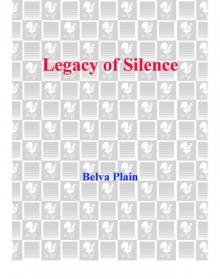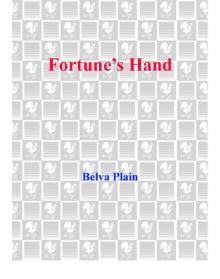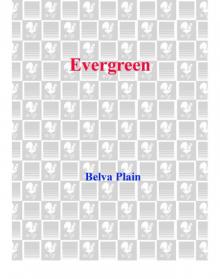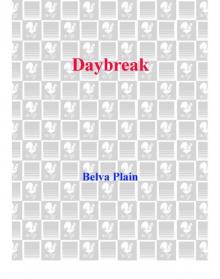- Home
- Belva Plain
Daybreak
Daybreak Read online
PRAISE FOR BELVA PLAIN AND DAYBREAK
“Her best and boldest work yet.”
—Big Sandy News (Louisa, KY)
“Plain writes with authority and integrity.”
—San Francisco Chronicle
“Belva Plain is at the top of her storytelling ability … she takes a bizarre tale and tells it intriguingly, with powerful action and strong emotional content.”
—The Newark Star Ledger (N.J.)
“Daybreak is … well-written and will make us all consider just what our own prejudices mean.”
—Wahpeton Daily News (N.D.)
“Plain is always rewarding!”
—San Jose Mercury News
“Belva Plain is a bestselling author for a reason; she presents a cast of characters that are both believable and likeable. The reader automatically becomes engrossed in the plot because there is a genuine concern about what will happen to the individuals involved.”
—Punch In
“Belva Plain has the ability to bring characters into your heart as real as your neighbors.”
—St. Clair County Courier (Mo.)
BOOKS BY BELVA PLAIN
LOOKING BACK
AFTER THE FIRE
FORTUNE’S HAND
LEGACY OF SILENCE
HOMECOMING
SECRECY
PROMISES
THE CAROUSEL
DAYBREAK
WHISPERS
TREASURES
HARVEST
BLESSINGS
TAPESTRY
THE GOLDEN CUP
CRESCENT CITY
EDEN BURNING
RANDOM WINDS
EVERGREEN
Published by
Dell Publishing
a division of
Random House, Inc.
1540 Broadway
New York, New York 10036
Copyright © 1994 by Bar-Nan Creations, Inc.
All rights reserved. No part of this book may be reproduced or transmitted in any form or by any means, electronic or mechanical, including photocopying, recording, or by any information storage and retrieval system, without the written permission of the Publisher, except where permitted by law.
For information address: Delacorte Press, New York, New York.
The trademark Dell® is registered in the U.S. Patent and Trademark Office.
eISBN: 978-0-307-78944-0
v3.1
To Matthew, David, Sarah,
Michael, Katherine, and Amy
with love
PROLOGUE
A man and a woman, facing a doctor at his desk, sat staring at the wall behind the doctor’s youthful head—it was often surprising how young such distinguished research scientists turned out to be—where stood a case of medical textbooks in dreary brown and melancholy gray.
The doctor had turned his gaze away from them toward the window that framed the dogwood grove in the park beyond the hospital; through this newborn blooming whiteness ran the wind of the southern springtime; then, shifting his gaze but a trifle, he could see the brick edge of the wing in which this couple’s son lay dying.
To die at eighteen, he thought, in such a spring, with the dogwood, the redbud, and the fragrant grass!
The woman was first to break an unbearable silence. “He has suffered so much, ever since he was born. The lung infections, the pancreas, the malnutrition, everything exactly according to the books. And now cirrhosis of the liver. It’s too much.”
And the husband added softly, “We didn’t know this was part of the disease. We never expected it.”
“It’s one of the rarer developments, that’s true.” The doctor nodded, parted his lips as though he were about to continue, but closed them together instead, so that the silence, thick as wool, wrapped itself around them all again.
Then the husband produced a timid question. “Is there—do you think there’s any chance that, after all, he might possibly—”
The doctor reflected that he had seldom felt so much pity. He had to riffle through papers on his desk before he could find an answer.
“Well, ‘possible’ is one thing. He has come through a good many battles. Babies, three-year-olds—I’ve seen many die. On the other hand, I had a patient once who held on till forty. It can happen.”
“But not often,” said the wife.
“No, not often. And in this case, where the liver is affected, you see—” The doctor paused. “But by this time you people must have learned all there is to know about cystic fibrosis.”
“Oh, yes. A generalized disfunction of the exocrine glands. Fairly common among Caucasians. Its molecular basis unknown. My husband and I have all the words, Doctor. They’re embossed on our brains.”
Knowing better, especially because he could see that the doctor, out of compassion, was withholding the final hopelessness, the husband still coaxed and hoped.
“We thought maybe coming here with these genetic studies among so many different families, and with all the blood work on my wife and me, that maybe you had come up with something new.”
“We’re surely trying.” The young man in the white coat was restless, shuffling little objects on the desktop, a paperweight, a pile of paper clips. Perhaps his patience was ebbing away. It must be hard to talk to the parents of a hopeless case, thought the older man.
“Oh!” cried the mother in her bitterness, “I’ll never understand! A hereditary disease, and never before in either of our families. And our other child with no sign of it. Thank God,” she added quickly.
The doctor got up from his chair, rising so abruptly that the chair made a little shriek as it scraped the floor. He walked to the window and stood there a moment with his hands locked behind his back, looking out upon the white sea of dogwood. When he turned again toward the room, it was with so strange an expression on his face that the parents were shocked.
“You found something,” the mother said quickly. “Something in our blood?”
“Yes.” The single syllable was very quiet.
“What? What?”
“We found, without the shadow of a doubt, that your son, that the boy upstairs cannot be, is not, your son.”
Contents
Cover
Other Books by This Author
Title Page
Copyright
Dedication
Prologue
Part I - Peter
Chapter 1
Part II - Laura
Chapter 2
Chapter 3
Part III - Tom
Chapter 4
Chapter 5
Chapter 6
Chapter 7
Part IV - The Crawfields
Chapter 8
Chapter 9
Chapter 10
Chapter 11
Chapter 12
Chapter 13
Chapter 14
Chapter 15
Chapter 16
Chapter 17
Special Preview from the Belva Plain Title The Carousel
Chapter One
About the Author
PART
I
Peter
CHAPTER
1
This must be what they mean, thought Margaret Crawfield, when they say “It hasn’t registered yet.” Now, with the funeral over—black cars moving slowly from the house then back to it, hushed voices, handclasps—now at the end of the dreadful week, with the flowers faded, the funeral foods eaten and kindly crowds gone, the terrible fact reveals itself at last. Peter is dead.
She walked. Through the rooms, down the hall, in and out, she walked. The rap of her heels was loud. The hum of the refrigerator and the slam of a car door across the street made the silence quiver.
Suddenly she heard herself ask aloud, “What are we
going to do?” The high, piercing voice, asking the passionate question, repeated, “What? What?”
She had no tears. There were, at this moment, none left, though there would be a lifetime of them for her and for them all, Arthur her husband, Holly her daughter, and the grandparents who had so dearly loved Peter.
On the dining room table, beside a bowl of brown daffodils drooping in stagnant water, lay a pile of condolence letters waiting to be acknowledged. She sat down, took the pen, began a sentence: Dear Cousin Andy, thank you for your—and put down the pen to stare out of the window.
Life was there, wind rippling through new leaves, crisp and creamy-green; robins hopping stiff-legged on the lawn; a baby carriage parked on the neighbors’ porch. Life.
She gave up. There would be no letters today. Not yet. Her hands, her arms, her shoulders were limp. Toy hammers beat lightly inside her head. So she sat, closing her eyes against the brightness.
“Mom?” said Holly. “Are you asleep sitting up? Are you all right?”
“No. Yes. I’m not asleep. I’m all right. I didn’t hear you come in.”
“I came in at the back door. I thought maybe you’d be taking a nap. Dad told you to lie down, didn’t he?”
“I know, but I can’t do it. I’m too restless.”
Holly laid a hand on the nape of her mother’s neck. “You’re all tense, all knotted there. Let me rub it for you.”
“Thank you.”
The warmth was good. Her daughter’s hand caring for her, loving her. It made the tears start up again, stinging and prickling the backs of her eyes.
“Thank you, darling. I should be doing something for you.”
“I’m fine. I’m younger,” said Holly, trying to tease, to lighten the heavy, heavy air.
Margaret swallowed hard and, making her own effort to lighten and brighten, remarked that it was Holly’s afternoon for hockey practice, wasn’t it?
“Yes, but I’m skipping it. Finals are coming up and I’ve missed so much that I can’t take time out for hockey.” Holly’s eyebrows drew together, giving her pretty face a look of anxiety. “I hate to leave you alone, so deserted, but I really should run over to Allison’s house. She has all the book assignments in Latin and chemistry that I missed.”
Margaret stood up. “Of course you should. Go over. I’m all right. We all are, you and Dad and I. We have to be.”
“I won’t be long, Mom.”
Margaret watched her go down the walk, with her books under her arm, her long hair flying in the wind and her long legs running. Not many months from now she’d be away in college. But not to think of that this minute.
“I’m all right, we all are,” she had just said to Holly.
Oh, brave words!
Ordinarily, at three o’clock in the afternoon Margaret Crawfield was busy, either at her part-time work as a tutor to housebound children or as a volunteer at the hospital. But not yet, not today while those toy hammers were still tapping in her head.…
She went upstairs and wandered, emptied a waste basket, put away a pink jacket that Holly had thrown over a chair, and straightened Arthur’s tie rack. She combed her hair; it wouldn’t do to look depressed, depressing Arthur to see her so when he came home. He never complained, he was a rock.… Her eyes filled again.
Presently her wandering brought her to Peter’s room, which she had been avoiding all week. Now she was drawn in. Facing her there was the closet door that, ajar, displayed shelves and empty hangers. She reached in and touched the hangers, remembering the shape and color of the clothes that had hung on them, the brown tweed jacket, the red windbreaker, and the good navy blue suit. All these had been given away on the day after the funeral, when thoughtful friends had come to clear out the closet and the drawers.
The rest of the room was untouched. Books, records, pictures, and posters remained, so that the room still looked as though Peter might walk in at any minute, sit down at the desk or lie down on the bed with his hands locked behind his head, while he listened to the New Orleans jazz he loved and could himself play so well. The piano downstairs was silent now; he had been the only one, in a family that cared very much about music, who had the skill to perform it.
She lay down on his bed. The room was filled with sunlight. On the opposite wall she stared at the outline of Mont-Saint-Michel on the poster between the windows. How happy he had been only two summers ago when they had all spent that month together exploring France! He had had such a great capacity for happiness! And that, in spite of everything he’d had to endure from the very moment, almost, of birth.
Her mind—my crazy, tormented mind, she thought—went back and back over the same worn path. Where the bed now stood, the crib had stood, across from the chest of drawers and the rocking chair, all of them adorned with painted ducklings in procession.
“For our first grandchild,” said Grandmother Frieda, “nothing is too good.”
And Grandpa Albert joked, “A beautiful boy, even though he has my son-in-law’s sandy hair.” He had put his hand on Arthur’s shoulder in affection.
It had been raining when they brought him home, but in this room, safe from the torrent, the baby had been snug. Nothing could harm that baby. Nothing.
Yet something had.…
Night after night he cried. There are few sounds as bewildering, she remembered, as a baby’s wail. Nothing had stopped Peter, not feeding, changing, or rocking.
“What can be wrong?” they asked the doctor and their friends and themselves.
“Oh, nothing but colic, it usually is just colic.” So the formula was changed, and that did work for a time. But only for a time. It had to be changed again and yet again. Then the doctor himself began to seem uncertain.…
One night Peter began to cough. Like any mother of a newborn, Margaret slept so lightly that the least murmur from the room across the hall sent her bounding across that hall in seconds.
The night light, a white kitten with illuminated eyes, shone on a tiny, purple-faced creature in torment. The cough was terrifying; he was struggling for air; the gasp, the snore, were like a death rattle—she had never heard a death rattle, yet that was the expression that leapt to mind.
“Oh, my God,” she said, and picked him up. But no, that was stupid. This was not a baby who was asking for comfort. This was—a dying baby? And she laid him back in the crib.
Arthur, whose deep, healthy sleep was what you might expect in a man so rational, so unflustered as he, had as yet heard nothing. She ran back and shook him awake.
“The baby! The baby,” she stammered. “I think he—I don’t know—”
On either side of the crib they stood. They looked once at each other, and with that wordless look each knew that this was the ultimate moment of decision, that they could not wait another minute.
“Wrap him up,” Arthur said. “We’ll throw on some clothes and take him. I’m afraid it’s pneumonia.”
She thought, as they rode through vacant streets, past darkened houses, “He will die before we get there.” And with her fingers groping under the wrapping of blankets she felt for the little heart.
Rain was flooding the city with an iridescent eerie gleam. It beat upon the windshield, and the wipers, madly sweeping, could barely keep up with it. In just such a storm they had brought Peter home when he was three days old. So happy, so proud they had been with their firstborn son!
The lights of the emergency entrance shone like a beacon to a ship at sea. Distraught, with their shoes untied, they rushed in. Competent hands took their baby from their arms; strangers took charge; the parents were helpless.…
“Yes,” the doctor said, “it is pneumonia. We have to keep him here, of course.” He looked over a chart, frowned a little, paused and remarked, though kindly, “He’s quite a little fellow for his age. But—well, I can’t tell you it’s not serious—but with antibiotics, you know …”
He was fumbling for something tactful to say, a way of giving these parents some encouragement f
or the night and the bleak ride home, but not too much encouragement. They knew all that.
“We can’t stay here?” asked Margaret, hopefully.
The doctor shook his head. “No point in it, anyway. He’ll be in an ICU. Better for you to go back and get some rest.”
So they went back, to lie awake together and wonder how the baby could have contracted pneumonia. He was never taken among crowds, and no one in the house had even had a cold. Nevertheless, such things did happen.…
When Peter recovered, he was only a handful, so thin that Margaret’s mother cried when she saw him.
“My pretty boy,” she kept saying, and held his head against her cheek. “Grandma will fatten you up, she’ll make you big and strong.”
He took a long time to become “big and strong.” His appetite was poor, he grew slowly, but eventually he did do all the right things, sat up, walked, and spoke his first words as babies are supposed to do, and was, in short, normal.
“Are we just a pair of fatuous parents?” asked Margaret, “or does he really have an exceptional disposition? It seems to me, when we’re at gatherings with lots of children his age, that Peter’s the smartest and the best behaved. Really and truly.”
“Foolish parent,” Arthur said, laughing at her.
But Margaret’s own mother said, “He’s going to be a rare man. Can’t you see he’s Arthur all over? Looks like him and acts like him, even at this age.”
“If he’s going to be like his father I’m twice blessed,” Margaret answered, and that night, in bed, was overcome with the love that had struck her when first she had seen Arthur across a crowded room.
She liked to think that was the night Holly had been conceived; the date seemed right, anyway.
They were so happy. Two babies in two years! They had everything, the whole world in their hands.
* * *

 The Golden Cup
The Golden Cup Her Father's House
Her Father's House Whispers
Whispers Crescent City
Crescent City Legacy of Silence
Legacy of Silence Crossroads
Crossroads Promises
Promises After the Fire
After the Fire Tapestry
Tapestry Looking Back
Looking Back Heartwood
Heartwood The Carousel
The Carousel Fortune's Hand
Fortune's Hand Homecoming
Homecoming Random Winds
Random Winds Harvest
Harvest Evergreen
Evergreen Treasures
Treasures The Sight of the Stars
The Sight of the Stars Secrecy
Secrecy Daybreak
Daybreak Eden Burning
Eden Burning